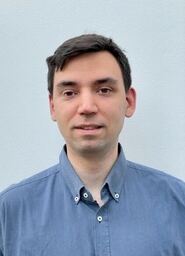Scaling Up Flag Algebras in Combinatorics completed
This project aims to obtain new bounds in Extremal Combinatorics through an application of flag algebras. The goal is to both improve the underlying computational aspects for existing problems as well as to further develop the theory of flag algebras to extend it to new areas of application.
🧑🎓 Project Members
🪙 Funding
This project was being funded by the Berlin Mathematics Research Center MATH+ (project ID EF1-21), itself funded by the German Research Foundation (DFG) under Germany's Excellence Strategy (EXC-2046/1, project ID 390685689) from October 2022 to September 2025.

🔬 Project Description
Computers have always been an important tool for mathematicians to conjecture, prove and verify mathematical statements. The use of computer assistance has been particularly fruitful in Extremal Combinatorics, where the most formalized and successful approach is an application of flag algebras, allowing one to establish bounds on certain problems through Semidefinite Programming (SDP). Razborov introduced the notion of flag algebras in 200, citing both Bondy’s work on the Caccetta-Häggkvist conjecture as well as Lovász and Szegedy’s work on graph limits as inspiration. He famously used flag algebras as a purely theoretical framework to establish the exact relation of triangle and edge density in graphs. As a computational framework, the main observation consists of observing that and underlying combinatorial optimization problem is equivalent to a (dual) conic optimization problem. Sums of squares (SOS) are used as a computationally feasible relaxation of this conic optimization problem that results in an SDP formulation. The density computations and the size of the SDP scale with the order of the squares where larger orders give better bounds but also result in quickly growing computational costs.

Figure. A flag algebra formulation of the asymptotic lower bound on the number of monochromatic triangles in two-colorings of the complete graph originally formualted by Goodman in 1959.
Many long-standing conjectures were resolved through this method, such as proving a conjecture of Erdős by determining the maximum number of 5-cycles in triangle-free graphs, and progress has been made on others, most notably Turán’s Conjecture about the maximum edge density of 3-uniform hypergraphs without 4-cliques. The theoretical framework was also extended to derive additional results from the generated information, such as the stability of extremal constructions. Existing applications have however largely been limited to a personal computing context.
This project aims to both improve the underlying computational aspects in order to scale up the flag algebra calculus for existing problems and theories and to open up new areas of application of the SDP-based flag approach. We have made first steps towards both steps with recent publications and are actively developing a software framework enabling other researchers to use the resulting tools.
💬 Talks and posters
Conference and workshop talks
- May 2025
- Forcing Graphs to Be Forcing by Christoph Spiegel
13th HJSDM Conference, Tokyo [PDF] - Jul 2024
- The Four-Color Ramsey Multiplicity of Triangles by Aldo Kiem
25th International Symposium on Mathematical Programming (ISMP), Montréal - Jul 2024
- The Four-Color Ramsey Multiplicity of Triangles by Aldo Kiem
13th Discrete Mathematics Days (DMD), Alcalá de Henares - Aug 2023
- The Rado Multiplicity Problem in Vector Spaces Over Finite Fields by Christoph Spiegel
12th EUROCOMB Conference, Prague [PDF] - Aug 2023
- Computational Challenges in Flag Algebra Proofs by Christoph Spiegel
ICIAM 2023: Advances in Optimization I (ICIAM), Tokyo [PDF] - Aug 2023
- Flag Algebras in Additive Combinatorics by Christoph Spiegel
5th DOxML Conference, Tokyo [PDF] - Jun 2023
- Towards Flag Algebras in Additive Combinatorics by Christoph Spiegel
FoCM 2023: Graph Theory and Combinatorics (FoCM), Paris [PDF] - Jun 2023
- The 4-color Ramsey Multiplicity of Triangles by Aldo Kiem
FoCM 2023: Graph Theory and Combinatorics (FoCM), Paris - May 2023
- Towards Flag Algebras in Additive Combinatorics by Christoph Spiegel
15th Combinatorial and Additive Number Theory Conference (CANT), New York [PDF] - Mar 2023
- Computer-assisted Proofs in Extremal Combinatorics by Christoph Spiegel
Workshop on Optimization and Machine Learning, Waischenfeld [PDF] - Jan 2023
- Fully Computer-assisted Proof in Extremal Combinatorics by Christoph Spiegel
Combinatorial Optimization Workshop (Aussois), Aussois [PDF] - Dec 2022
- Leveraging Combinatorial Symmetries in Flag Algebra-based SDP Formulations by Christoph Spiegel
Workshop on Recent Advances in Optimization, Toronto [PDF]
Research seminar talks
- Oct 2025
- Sidorenko's Conjecture, Graph Operators and Box Products with Certain Subgraphs of Hypercubes by Aldo Kiem
ACO Student Seminar, Atlanta - Jan 2025
- Forcing Graphs to Be Forcing by Christoph Spiegel
Research Seminar TCS, Heidelberg - Jun 2024
- Categorification of Flag Algebras by Aldo Kiem
LIMDA Seminar, Barcelona - Feb 2023
- The Four-color Ramsey Multiplicity of Triangles by Christoph Spiegel
LIMDA Seminar, Barcelona [PDF] - Nov 2022
- Flag Algebras for Edge-colored Graphs by Aldo Kiem
Research Seminar Combinatorics, Berlin
Poster presentations
- Jul 2024
- Categorification of Flag Algebras by Aldo Kiem
13th Discrete Mathematics Days (DMD), Alcalá de Henares
📝 Publications and preprints
Preprints
- Kiem, A., Parczyk, O., and Spiegel, C. (2024). Forcing Graphs to Be Forcing.
[arXiv]
[BibTeX]
@misc{2024_KiemParczykSpiegel_Forcing, archiveprefix = {arXiv}, eprint = {2412.12904}, arxiv = {arXiv:2412.12904}, primaryclass = {math.CO}, year = {2024}, author = {Kiem, Aldo and Parczyk, Olaf and Spiegel, Christoph}, title = {Forcing Graphs to Be Forcing}, date = {2024-12-17} }
Conference proceedings
- Kiem, A., Pokutta, S., and Spiegel, C. (2024, May). Categorification of Flag Algebras. Proceedings of the Discrete Mathematics Days.
[URL]
[BibTeX]
@inproceedings{2024_KiemPokuttaSpiegel_Categorificationflagalgebras, year = {2024}, booktitle = {Proceedings of the Discrete Mathematics Days}, month = may, url = {https://dmd2024.web.uah.es/files/abstracts/paper_47.pdf}, author = {Kiem, Aldo and Pokutta, Sebastian and Spiegel, Christoph}, title = {Categorification of Flag Algebras} } - Kiem, A., Pokutta, S., and Spiegel, C. (2024). The Four-color Ramsey Multiplicity of Triangles. Proceedings of the Discrete Mathematics Days.
[URL]
[arXiv]
[code]
[BibTeX]
@inproceedings{2023_KiemPokuttaSpiegel_4colorramsey:1, year = {2024}, booktitle = {Proceedings of the Discrete Mathematics Days}, url = {https://dmd2024.web.uah.es/files/abstracts/paper_3.pdf}, archiveprefix = {arXiv}, eprint = {2312.08049}, arxiv = {arXiv:2312.08049}, primaryclass = {math.CO}, author = {Kiem, Aldo and Pokutta, Sebastian and Spiegel, Christoph}, title = {The Four-color Ramsey Multiplicity of Triangles}, code = {https://github.com/FordUniver/kps_trianglemult} } - Rué, J. J., and Spiegel, C. (2023, April 1). The Rado Multiplicity Problem in Vector Spaces Over Finite Fields. Proceedings of the European Conference on Combinatorics, Graph Theory and Applications.
DOI: 10.5817/CZ.MUNI.EUROCOMB23-108
[URL]
[arXiv]
[code]
[BibTeX]
@inproceedings{2023_RueSpiegel_Radomultiplicity:1, year = {2023}, booktitle = {Proceedings of the European Conference on Combinatorics, Graph Theory and Applications}, doi = {10.5817/CZ.MUNI.EUROCOMB23-108}, url = {https://journals.muni.cz/eurocomb/article/view/35642}, archiveprefix = {arXiv}, eprint = {2304.00400}, arxiv = {arXiv:2304.00400}, primaryclass = {math.CO}, author = {Rué, Juan José and Spiegel, Christoph}, title = {The Rado Multiplicity Problem in Vector Spaces Over Finite Fields}, code = {https://github.com/FordUniver/rs_radomult_23}, date = {2023-04-01} }
Full articles
- Kiem, A., Pokutta, S., and Spiegel, C. (2025). The Four-color Ramsey Multiplicity of Triangles. Journal of Combinatorial Theory, Series B.
[arXiv]
[code]
[BibTeX]
@article{2023_KiemPokuttaSpiegel_4colorramsey, year = {2025}, journal = {Journal of Combinatorial Theory, Series B}, archiveprefix = {arXiv}, eprint = {2312.08049}, arxiv = {arXiv:2312.08049}, primaryclass = {math.CO}, author = {Kiem, Aldo and Pokutta, Sebastian and Spiegel, Christoph}, title = {The Four-color Ramsey Multiplicity of Triangles}, code = {https://github.com/FordUniver/kps_trianglemult} } - Rué, J. J., and Spiegel, C. (2025). The Rado Multiplicity Problem in Vector Spaces Over Finite Fields. Finite Fields and Their Applications.
[arXiv]
[code]
[BibTeX]
@article{2023_RueSpiegel_Radomultiplicity, year = {2025}, journal = {Finite Fields and Their Applications}, archiveprefix = {arXiv}, eprint = {2304.00400}, arxiv = {arXiv:2304.00400}, primaryclass = {math.CO}, author = {Rué, Juan José and Spiegel, Christoph}, title = {The Rado Multiplicity Problem in Vector Spaces Over Finite Fields}, code = {https://github.com/FordUniver/rs_radomult_23} }




